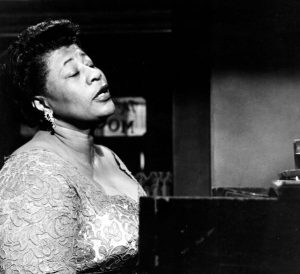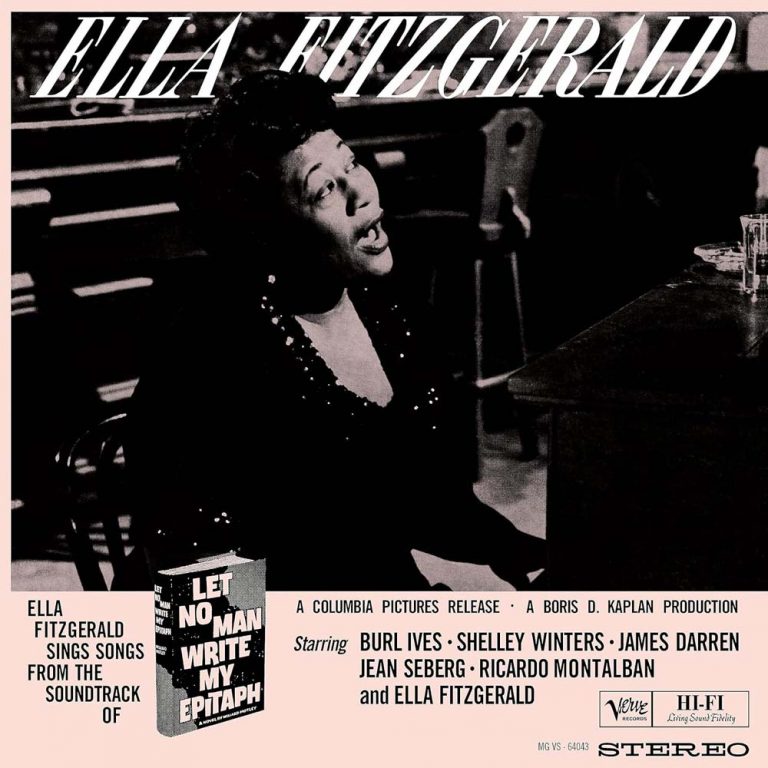Ella Fitzgerald appeared and sang in only four films throughout her illustrious career. She had bit parts in “Ride ‘Em Cowboy”, “Peter Kelley’s Blues”, and “St Louis Blues”, a biopic about the ‘Father of the Blues’ W. C. Handy, which starred Nat ‘King’ Cole.
Her most significant role was in the 1960 black and white film “Let No Man Write My Epitaph”, an adaptation of a 1958 novel by Willard Motley. It starts with the joy of Christmas but gets progressively darker. Centred around the life story of a young boy, Nick Romano, who was orphaned after his mother died of a drug overdose, he is then adopted by a kind-hearted woman named Nellie and a close-knit community of misfits. For Nick, an aspiring pianist, the central question is whether he will grow up and succumb to the temptations of street life or fulfill his potential.

Starring James Darren, Burl Ives, Shelley Winters, and Ricardo Montalban in the lead roles, in the film’s opening scene, we see Ella Fitzgerald as the drug-addicted blues singer Flora, playing the piano in a bar and mournfully singing “I Can’t Give You Anything but Love”. Ella only appears on screen for ten to 15 minutes. Despite her small role, the accompanying album showcases her incredible vocal skills.
Ella was renowned for her jaunty and incredibly virtuosic interpretations of jazz standards. For example, listen to her live take of the Steve Allen tune “This Could Be The Start of Something Big”, one of the tracks on the soon-to-be-released “Clap Hands, Here, Comes Charlie,” a fantastic showcase for her vocals.
But Ella’s approach to singing the songs from the soundtrack of “Let No Man Write My Epitaph” required a very different technique. It’s often been said that Ella couldn’t emotionally inhabit the blues (side of jazz) like singers such as Billie Holiday, Carmen McRae or Sarah Vaughan. Well, this album debunks that myth. It’s a simple, intimate duo setting with Ella on vocals and bebop aficionado Paul Smith on piano. Paul, a much-in-demand pianist and accompanist for the likes of Dizzy Gillespie, Doris Day, and Chet Baker, spent 25 years as the music director for the legendary “Steve Allen Comedy Hour” and worked with Ella as her musical director on and off for nearly 40 years.
Featuring 13 songs, the album begins with “Black Coffee”, the first of several that capture the essence of heartbreak. The tracklist includes the Ray Noble song “I Hadn’t Anyone Till You” and the Erroll Garner classic “Misty.”
As Ella sings Ernie Burnett’s “My Melancholy Baby” lyric – “every cloud must have a silver lining” – she imbues it with a nostalgic poignancy. Her interpretation of “September Song”, with its beautifully held legato notes, shows off her excellent tone and range. It’s an album that isn’t just for the heartbroken. It’s for anyone who has loved or is trying to hold onto love. And there is hope; it’s not all bleak. The lyrics of the final tune, “Reach for Tomorrow” – “you may get hurt in a thousand ways / but give it one more try” – are there to remind us.
Frank Sinatra’s take on the classic Harold Arlen and Johnny Mercer tune “One for My Baby” is often considered the definite interpretation of that song, but listen to how Ella hits the key change in the second verse. Bringing a frisson of loss mixed with a tinge of anger, which becomes a full-blown anthem through the line “you’ll never know it, I’m a kind of poet”, slowly sliding back into a sort of resignation as she loops the refrain (“one for my baby, one for the road”). It’s one of the standout tracks on the album.
As the album journeys musically through the various stages of yearning, despair, heartbreak and dashed hopes, Ella showcases exceptional vocal restraint. To enjoy the album at its best, put on your headphones, prepare yourself a nice cup of tea and immerse yourself in its clarity. The remastered 180-gram vinyl has been transferred from the original analogue tapes, allowing you to experience Ella’s breath control and tonal choices.
For vocalists who aspire to sing the jazz canon or, in fact, any jazz lover, it’s an excellent addition to your collection. It’s not surprising that this is considered to be one of Ella’s most significant recordings. Its simplicity is its beauty.
Read on… Great Women of Song: Carmen McRae
Jumoké Fashola is a journalist, broadcaster and vocalist who currently presents a range of Arts & Culture programmes on BBC Radio 3, BBC Radio 4 & BBC London.
Header image: Film still of Ella Fitzgerald from ‘Let No Man Write My Epitaph’, 1960. Photo: Everett Collection Inc / Alamy Stock Photo.



